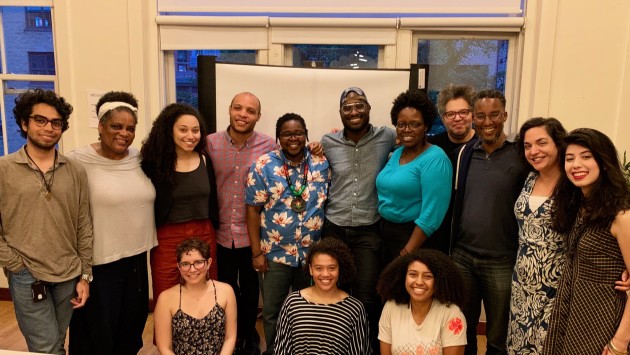The Lilith Blog 1 of 3
November 11, 2019 by admin
Why She Needed to Create the Jews of Color Torah Academy
By Arielle Korman
In October 2018, I sat alone in the rare book room in the library at Columbia University with a dusty pink notebook that had once belonged to a 17th-century Moroccan Yeshiva student. The script was challenging to read and yet, with focus and my ever-growing knowledge of Hebrew–and access to scholars of Jewish Studies to guide me–I found myself able to engage in an encounter with his writing and watch as his thoughts and educational life emerged from the page. Education could give me the tools to ignite histories and Torah simultaneously ancient and new.
I remember a time not long ago in which I could read Hebrew, chant it, recognize words, but not understand the text before me. I remember visiting Orthodox cousins and watching them davening, a flurry of words on their tongues. In contrast, my immediate family could not speak a word of Hebrew and, for a long time, Hebrew remained a mystery language to us. At times growing up it was difficult to feel ownership over my Jewishness. I remember being told as a child that I was not even Jewish by a person who simply looked at my mother, who is Filipina and Jewish, and made an assumption. I did not grow up seeing very many people in my Ashkenazi Jewish community who looked like me or my family, which is not to say they were not there— they always were, but spread out in different communities or perhaps none at all. Jews I meet in life have often assumed I know less about Judaism or am not Jewish based on the way I look. Though in my heart I have always felt deeply Jewish, so many cues in the world around me and in my own education told me that it must not be the case.
Particularly outside of Orthodox spaces, Hebrew and Jewish education in this country are inaccessible at best, and unnecessarily expensive (Adult Beginning Hebrew classes in New York regularly range from $500- $800 for a season). Hebrew is by no means the best or only Jewish language, but it is one that can grant access to a wealth of Jewish texts and histories spanning time periods and continents. The distinctly American myth that adults cannot learn new languages impedes access to Hebrew courses. The pervasive idea is that if you did not or could not access Hebrew or Jewish education as a child, if you do not have the yichus, the background, as some might say, then you will not be successful. Jews of Color have as many individual experiences as there are Jews of Color in the world, but the JOC community includes many adult learners wanting a Jewish education who are particularly likely to fall through the cracks. When you add pervasive racism, which exists even in the most progressive majority-white Jewish spaces, Jewish learning spaces that do exist can still not be the right place for good learning to occur.
…

My friend and colleague Yehudah Webster and I co-founded Ammud, the Jews of Color Torah Academy, in the Spring of 2019, as a space for Jewish education for Jews of Color by Jews of Color. The project was incubated in the Jews of Color Caucus at Jews for Racial and Economic Justice (JFREJ). We borrowed the name JOC Torah Academy from Yavilah McCoy, a prominent organizer and educator who has for many years been building the bedrock for JOC visibility and community on which we stand. We began this past year to feature members of the JOC community as teachers and watched as participants arrived from around New York City, online through Zoom, and even from other states, traveling long ways to come and learn.
One day a week, Ammud hosts a beginning Hebrew course, a conversational Hebrew group, and an open Beit Midrash, where participants can learn in community and chevruta partnerships. Every other week, we engage in seminar-style learning in cycles of mini-courses featuring JOC leaders. We meet at NYU’s Bronfman Center, one of our official partners, Despite the challenges of racism that many JOCs face daily, it is not all so dismal, and we are not solely building this community as a response to a lack. Rather, we are dreaming up new realities, celebrating each other, working to ensure we are a space for restorative dialogue, where we love and protect each other and hold oppressive behavior accountable, and sharing learning for this world and the one to come.
I am a musician and davening leader in a mostly White Ashkenazi community. This year, as I played, I held an extra kind of warmth inside of me, knowing there is a home base for me at Ammud, where I will be seen as fully Jewish and never questioned, where I can learn from voices often on the margins of the Jewish world, and deepen my own Torah.
…
Arielle Korman founded the JOC Torah Academy in early 2019 along with Yehudah Webster. She is a current graduate student in Jewish Studies at Columbia University, a musician and Jewish song leader, and a member leader at Jews for Racial and Economic Justice (JFREJ) in New York City.
At ammud.org, you can learn more, view FAQs on the term “Jews of Color” as well as other topics, and donate to help sustain and grow this work. JOCs are welcome and encouraged to join a class or simply join as a member, and non-JOCs are invited to join as members of the Allies Circle, which grants access to select events and materials.
 Please wait...
Please wait...